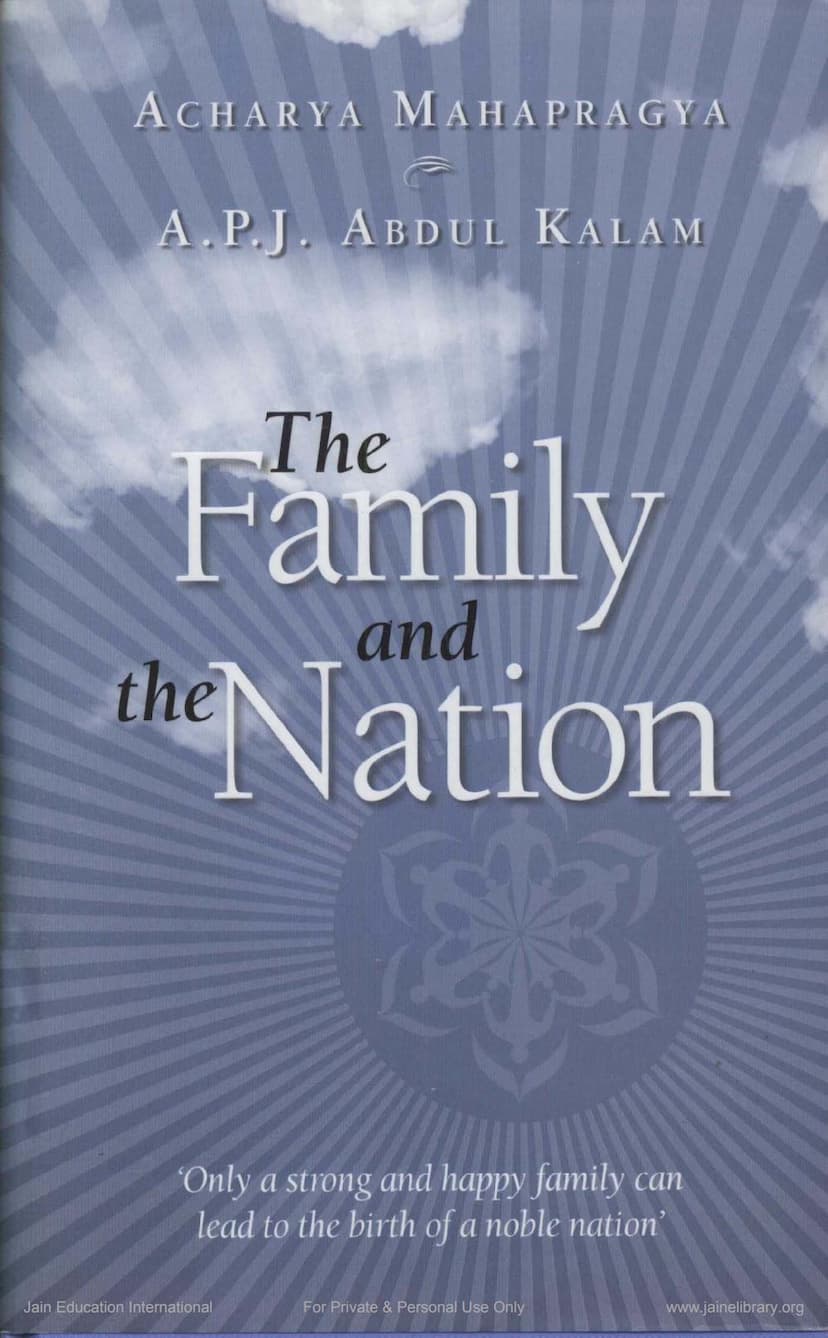Family And Nation
Added to library: September 1, 2025

Summary
This book, "The Family and the Nation" by Acharya Mahapragya and A.P.J. Abdul Kalam, advocates for the foundational role of strong, happy families in building a noble nation. It argues that while economic prosperity and military strength are important for India's rise, true sustainability and success stem from values, with the family serving as the bedrock of these values. The book emphasizes spirituality as a means to create a better world and a noble nation, offering a counterpoint to modern consumerism by highlighting the sanctity of the natural world and its power to inspire creativity and love.
The authors, a revered Jain Muni and a visionary scientist and former President, draw upon their vast experiences to address the profound social changes occurring in India. They propose that a noble nation, fulfilling India's 5,000-year-old civilization, can only be built upon the foundation of strong families that instill the right values in individuals. The book aims to set a new agenda for social change, guiding India towards its rightful place as a great nation.
The text delves into:
- The Dynamics of Indian Culture: It traces the evolution of Indian culture, highlighting its richness in religion, philosophy, science, art, and social organization. It acknowledges the influence of various historical invasions and cultural fusions that have shaped India's unique civilization. The book discusses the Jain perspective on the origins of civilization with Lord Rishabh and the development of social structures, emphasizing the synthesis of activity (pravritti) and abstinence (nivritti) as key to India's dynamism and morality. It also explores the Indian philosophical concepts of Dharma, Artha, Kama, and Moksha, and the contributions of various Indian thinkers and scientists throughout history.
- The Evolutionary Process and Pain: This section examines the concept of development in relation to human needs and the cosmos. It discusses the idea of humanity's connection to the Universe, exploring the Jaina concepts of Jiva (sentient) and Ajiva (non-sentient) and how their interaction leads to suffering. The authors also touch upon the role of faith, the moral law, the creative power of thought, and the importance of the "Inner Power" within each individual for personal transformation and societal progress. They highlight the concept of "seven sins" (wealth without work, pleasure without conscience, etc.) as detrimental to a society.
- The Idea of Unity: This chapter focuses on the concept of unity, both within individuals (mind and body) and across society and humanity. It explores various philosophical perspectives on the nature of reality, the universe, and the human condition from thinkers like Spinoza, Leibniz, and Schopenhauer. The text emphasizes that true well-being comes from harmonious relationships, mutual respect, and a shared vision. It discusses the importance of faith, the role of different religions in promoting brotherhood, and the concept of "unity of minds" as crucial for peace and societal progress. The book also touches upon the challenges of poverty and the need for inter-religious dialogue and cooperation.
- Creating Healthy Individuals: This section outlines nine "aphorisms of health" for individuals, including freedom, self-control, fearlessness, moderation, broadmindedness (tolerance), a balanced nervous system, biochemical balance, ethical conduct, and healthy economics. It stresses the importance of emotional intelligence, positive thinking, and spiritual training in building a healthy individual. The authors also discuss the detrimental effects of negative emotions and the need for a holistic approach to health that integrates physical, mental, and spiritual well-being.
- The Birth of a Beautiful Home: This chapter emphasizes the family as the fundamental institution for nurturing values, progress, and peace. It discusses the importance of love, faith, self-discipline, and responsibility in creating a happy home. The book delves into the philosophy of Anekanta (non-absolutism) and its application in family life, highlighting the principles of autonomy, interdependence, reconciliation, and moderation. It also addresses the impact of samskaras (imprints of past actions) on family dynamics and the importance of purifying emotions, particularly through ahimsa (non-violence) in thought, word, and deed.
- Birth of a Noble Nation: The concluding chapter outlines the vision for a noble nation characterized by a clean and green environment, economic prosperity without poverty, peace without fear, and happiness for all citizens. It proposes a three-pronged approach to healthcare (mind-body approach), the evolution of enlightened citizens through value-based education and the transformation of religion into spirituality, and economic development for societal transformation, emphasizing the creation of a knowledge society. The PURA (Providing Urban Amenities in Rural Areas) mission is presented as a key strategy for rural development and economic empowerment. The chapter also highlights the importance of unity of minds, ethical conduct, and the role of individuals, families, and communities in building a peaceful and prosperous nation, advocating for the principle of "work with integrity and succeed with integrity."
The book concludes with a prayer for peace and prosperity, emphasizing the interconnectedness of righteousness in the heart, character, home, nation, and the world. The authors express hope that by fostering beautiful families, India can evolve into a noble nation and serve as a model for the planet.